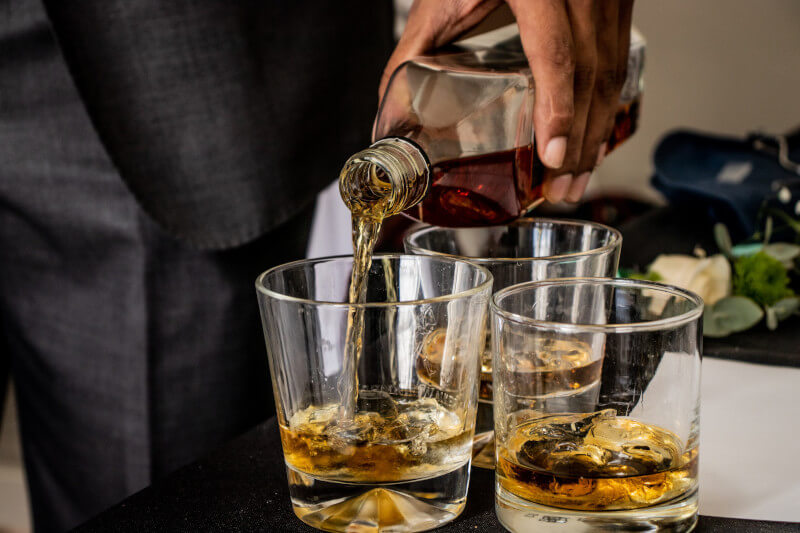Whiskey drinkers all across the world want to know if whiskey ever goes bad. The solution, like so much else in life, is conditional. We are often asked this, so we thought we’d provide a definitive response. Everything you have to understand about the potential for your expensive whiskey to spoil is right here.
Whiskey is an alcoholic beverage produced by distilling a mash of fermenting grains. It is often very alcoholic and is aged in wooden (mostly oak) casks. Many people think whiskey never goes bad because of its substantial alcohol concentration. But in reality, it’s not like that at all.
Although whiskey’s high alcohol content makes it very stable, it can nevertheless go bad if not stored properly. For instance, if whiskey is left out in the open for too long, it may oxidize and become rancid. Whiskey can also develop mold or mildew if it is kept in a too-warm or damp location.
How Long Does Unopened Whiskey Last?
You’re in luck if you haven’t cracked open the bottle yet. Whiskey can be kept for unlimited amounts of time if it is never opened. That’s true, your beloved whiskey won’t lose any of its quality after a few years have passed.
Once a Bottle of Whiskey Has Been Opened, How Long Does It Last?
Once a bottle of whiskey is opened, its expiration date is effectively set. If your bottle is at least halfway full, it can keep whiskey fresh for up to two years; if it’s almost empty, with a quarter of a bottle or less of whiskey left, it will go bad in around six months, according to most scientists. How come? The most important factor is oxygen. Reduce the volume of whiskey in the bottle to speed up the oxidation process. Over time, oxidation can cause the whiskey to lose its original flavor and spoil.
Does Whiskey Spoil if It’s Too Hot?
Whiskey won’t go bad if exposed to sunshine, heat, or temperature fluctuations, but it will change flavor in both opened and unopened bottles. Whiskey absorbs oxygen as its volume fluctuates as a result of temperature changes. Whiskey’s color might fade if exposed to sunlight for an extended period. Whiskey can also evaporate at a faster pace in hotter temperatures. Avoid this by keeping your whiskey bottles in a cool, dark place.

If you don’t want your favorite bottle of whiskey to spoil before its time, learn how to store and seal it properly. If you follow these guidelines, your whiskey will retain its flavor for much longer than if it were improperly preserved:
Put Away Somewhere Hidden
Avoid placing your whiskey bottles on display on a bar cart beside a window; instead, store them in a dark place like a pantry, wine cellar, or liquor closet.
Please Refrigerate Your Bottles
If you don’t have access to a chilly area to store your bottles of whiskey, keeping them at room temperature will do. Just keep the temperature steady and away from extremes.
Store Them Vertically
A bottle of corked whiskey should never be laid on its side. Unlike wine corks, which provide an airtight seal, whiskey corks can allow some leakage or evaporation to occur over time.
Periodically Retighten
Corks and screw caps can loosen with time, so it’s important to check on your collection sometimes to make sure the bottles are properly sealed.
Put Back Unfinished Bottles
Opened whiskey can be stored for longer if you transfer it to smaller bottles. The oxidation process is slowed down because there is less area for oxygen in a smaller bottle.
Is It True That Whiskey Improves With Age?
Since bottled whiskey does not improve with age as wine does, there’s no point in letting it sit about collecting dust when you can enjoy it with friends and family or in a whiskey cocktail. Whiskey, like other hard liquors, develops its distinctive flavor while it ages in barrels after being distilled. Whiskey no longer ages after being bottled. The procedure must be carefully monitored by master distillers. A whiskey’s flavor and complexity improve with time in the barrel, making older whiskey more sought after by connoisseurs. But there must be a balance: It will become woody and bitter if allowed to age for too long.
Can Drinking Old Whiskey Make You Sick?

Don’t be afraid to try that dusty bottle of whiskey from the back of the liquor cabinet. A common misconception is that outdated alcohol, like other perishables, will make you sick. The only possible downside is a lackluster flavor and an unremarkable drinking experience. Drinking too much alcohol is what can make you sick, so keep that in mind.
WhiskeyD Products is a Must-have for Any Bar
With your newfound knowledge of whiskey’s shelf life and suitable storage techniques, now is the perfect moment to add a bottle from WhiskeyD to your collection.
